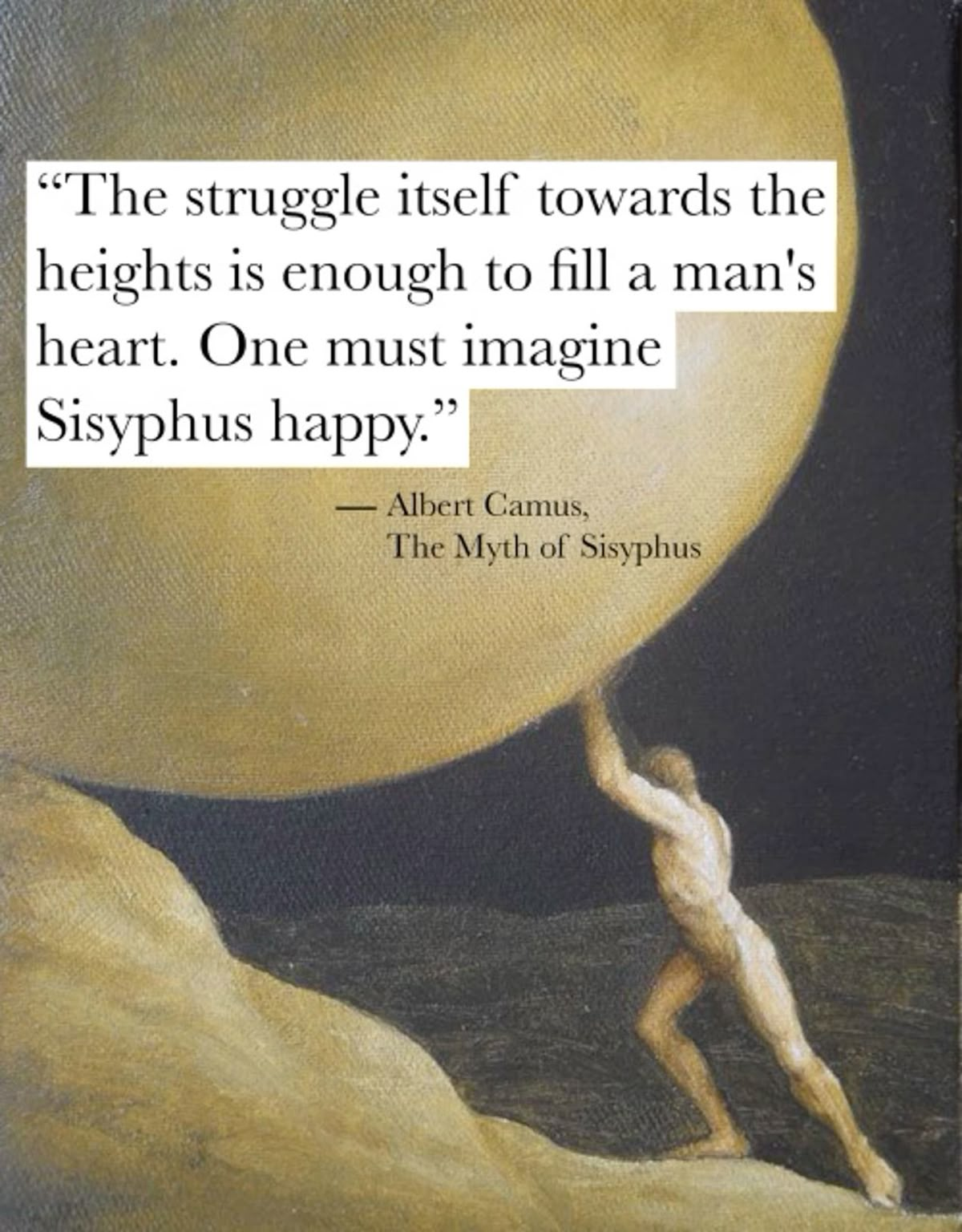How to Lose Forever and Still Win
Camus said we must imagine Sisyphus happy. Maybe the secret isn't in conquering the mountain but in laughing as the rock tumbles back down. A meditation on absurdity, rebellion, and the art of pushing anyway.

"One must imagine sisyphus happy"
I keep returning to the myth of Sisyphus. Not because I find solace in its ancient cruelty, but because it mirrors a question that haunts me daily. A question that feels both deeply personal and universally human.
This question keeps hitting me like a truck: Why do anything? Not in the practical sense, why eat, why work, but in the cosmic one. Why keep pushing the boulder when it will only roll back down? Why wake, why strive, why care, in a universe that simply shrugs?
I jot these words, strike them, only to jot them back down again. Camus said to imagine Sisyphus happy. Happy? I scoff as I write this. The man's drenched in sweat, muscles aching, screaming as he watched the rock tumble down again. Condemned for all of eternity. If this is philosophy's answer to futility, it feels like a taunt or some kind of sick twisted riddle. I don't know.
Maybe I'm missing something. Let's start over.
Sisyphus is condemned. The Gods' designed his punishment to mirror life itself: effort without progress, labour without legacy. Jobs that drain us, relationships that fray, dreams that dissolve like cotton candy in the rain. We're all pushing rocks aren't we? And yet, Camus insists he's happy. Why though? Is it delusion? Stubbornness? Some kind of existential sleight of hand?
Wait. But what if the key isn't the boulder, but the pause? The heartbeat between the rock's descent and Sisyphus' return. In that moment, he could collapse. Weep. Curse the Gods. But Camus says he turns, walks back down and chooses to begin again. Not because he must, but because he does. There's a quiet violence in that. A revolt.
But a revolt against what exactly? The absurdity of it all? The God? Or his own despair?
Nihilism says that "nothing matters" and collapses inwards. Hedonism says "distract yourself" and evaporates. But Sisyphus does neither. He stares into the void and just laughs. Not a joyful laugh either, but a ragged, defiant one. The kind you hear in hospitals at 3am.
I think of my friend as I write this, a nurse, walking through night shifts in a fluorescent-lit ward. A couple of weeks back, she held a dying man's hand because no one else would. No one will carve that moment on a monument. It rolled back down the hill when sunrise came. Yet when she tells me of it, her voice doesn't shake with despair. It softens with something like pride.
Rebellion, Camus calls it. Not the clash of swords but the quiet revolt of making tea at dawn, of sending a risky text, of humming in an empty room. The rock becomes our collaborator. Its weight proves we can still lift. Its roll gives us a reason to climb again, differently, better.
Is that his secret? Maybe the boulder isn't the enemy. The myth's cruelty lies in its illusion of failure. The rock rolling back, the summit never held. But what if rolling is the point? What if meaning isn't found in conquering the mountain but the way our palms learn the shape of the stone, how our legs grow steady on the slope.
I remember my mother kneading dough every night for dinner, her hands cracked from labour. No cosmic meaning in those rotis. Just flour and water and her stubborn refusal to let the world go stale.
Am I romanticising suffering? Maybe. But isn't that humankind's superpower? We turn survival into art. I think of nurses during the pandemic, cycling through shifts that broke them. The teacher buying supplies with their own money. The activist chaining themselves to fences. Futile? Maybe. But their rocks become altars. Sisyphus, calluses thick as armor, might've discovered a rhythm to his climb: two steps, breath, lean into the slant of light. Who's to say he didn't laugh as the boulder tumbled? Again? Fine. Watch me.
The Gods thought they'd trapped him. They didn't realise he'd stolen the key: the right to choose how to carry the weight.
I'm circling back to Camus' line: "One must imagine sisyphus happy". Maybe imagine isn't the operative word. Not "he is happy" but we decide he is. Because if Sisyphus, eternally thwarted, eternally labouring, can embody dignity, then so can we. Not by defeating the absurd but by dancing with it. We push the rock because we can. Because in the pushing, we become. The meaning isn't ahead of us, it's in the heat of our hands, the grit under our nails, the stories we etch into the stone with every scrape.
I close my eyes. This essay is still messy and very much unresolved. But something shifts inside me. The rock isn't rolling away anymore, it's rolling with me. And I guess maybe that's enough.